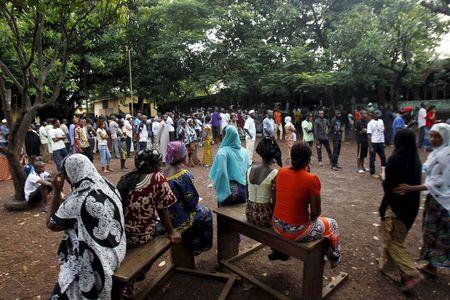Advertisement
Polls open in Guinea election amid tight security
CONAKRY (Reuters) - Long lines formed in front of guarded polling booths across Guinea on Sunday as the West African country voted in its second free election in nearly 60 years since independence.
Guinea -- Africa's leading producer of bauxite, the raw material for aluminum -- has a history of election violence linked to ethnic tensions, including in a 2010 vote that brought President Alpha Conde to power.
The streets were calm in the capital Conakry on Sunday after clashes this week between security forces and supporters of rival parties that left several dead and dozens injured.
Plain-clothes policemen stood vigil at booths early in the day while anti-riot police took positions at street corners to check vehicle permits amid tight security measures.
"I am happy to have voted. I hope everyone does it in peace and that all goes smoothly," said Mamadouba Camara, the first voter in polling station No. 5.
But voters in the opposition neighborhood of Hamdallaye complained that they had not received voting materials by around 0400 ET while some officials had not yet arrived there.
Conde is widely expected to win a second mandate, though analysts expect the results to be close enough to require a second round. His opponents including main rival Cellou Dalein Diallo had sought a postponement of the vote, citing irregularities.
But in an attempt to defuse tensions between his mostly ethnic Peuhl supporters and those drawn from Conde's Malinke community, Diallo said on Saturday he would participate in the presidential election.
United Nations Secretary General Secretary-General Ban Ki-moon late on Saturday deplored the recent violence and called for political leaders to resolve disagreements through dialogue.
Conde's campaign, whose slogan is "progress is on the march", has championed infrastructure projects to improve power supply in the poor, former French colony.
However, opponents have sought to capitalize on his shortcomings such as the nearly two-year-old battle against the Ebola virus and declining investment in the mining sector.
(Reporting by Saliou Samb and Luc Gnago; Writing by Emma Farge; Editing by Mark Heinrich)



















Add new comment